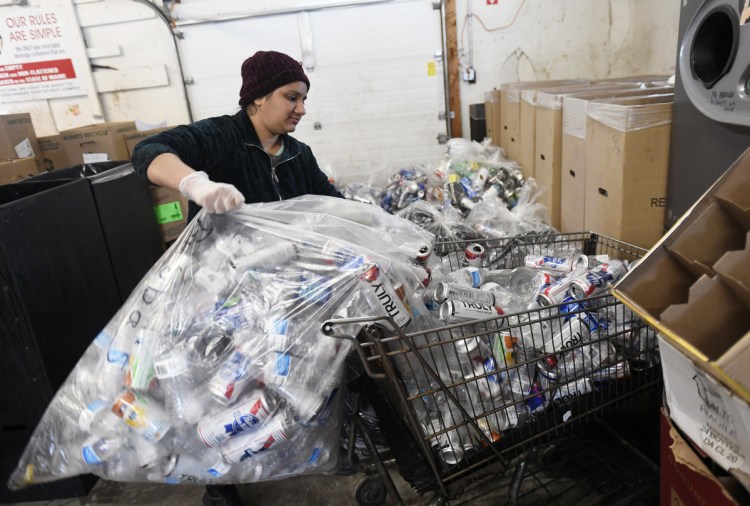AUGUSTA – A legislative committee has endorsed a penny-per-container increase in the handling fee paid to Maine’s 300-plus redemption centers but lawmakers appear uninterested in changing the 5-cent deposit collected under the 40-year-old “bottle bill.”
Lawmakers are considering tweaking Maine’s bottle deposit program along with a host of other recycling- and waste-related measures at a time when municipalities, redemption centers and recycling centers are struggling with economic changes both at home and abroad. Many towns are scaling back recycling programs – particularly for plastics and paper – because the overseas market for those commodities has collapsed. Meanwhile, redemption center owners say annual minimum wage increases in Maine are making it difficult for them to stay afloat financially.
Earlier this week, the majority of members of the Legislature’s Environment and Natural Resources Committee supported a bill that would increase the handling fee collected by redemption centers by a half-cent this May and another half-cent in January. Redemption centers currently receive a 4-cent handling fee for each container, paid by either beverage manufacturers or wholesale beverage distributors.
Kim Mercier, owner of Pine Street Redemption Center in Madison, was one of more than a dozen redemption facility owners who testified or submitted comments to the committee during an hours-long hearing last month. Mercier warned that with the minimum wage slated to rise another dollar to $12 an hour next January – compared to $7.50 an hour in 2016 – it might not be feasible for her to continue operating Madison’s only redemption center.
“I do think it will help,” Mercier said Friday of the proposed 1-cent increase. “I also think the state can do more to streamline how we process the bottles. More commingling would certainly help.”
The committee report was not unanimous, however, meaning there will likely be debate when the bill, L.D. 248, hits the House and Senate floors. The large beverage producers such as Coca-Cola as well as Maine’s burgeoning craft brewing industry also oppose the handling fee increase, which will increase costs that will have to be absorbed or passed along to customers.
Sean Sullivan, executive director of the Maine Brewers’ Guild whose membership includes most of the state’s 100-plus craft brewers, estimated that a 1-cent handling fee increase will cost manufacturers more than $3,000 for every 1,000 barrels of beer. While Sullivan said those costs may eventually be passed along to consumers, it will be the small brewers that will absorb them in the short-term. And increasing the handling fee is unlikely to result in an increase in Maine’s recycling rate, which is the purpose of the bottle bill, Sullivan said.
“Many of our brewers are very passionate about environmental sustainability and certainly want to see recycling rates increase,” said Sullivan, who pointed out that many brewers have shifted to cans because of its recycling advantages over glass. “We just think that taking a step back and looking at this more holistically, and not looking for a quick fix, would be a better way forward.”
Maine collects more recyclable beverage containers per capita than any other state in the nation thanks, in large part, to the bottle bill. According to data from the Container Recycling Institute, each Mainer turned in, on average, more than 700 recyclable bottles and cans in 2010 compared to roughly 200 containers in states without a deposit. That gives the state a container recycling rate of close to 90 percent, although that figure does not include non-deposit items.
Maine’s so-called “bottle bill” has become a perennial issue before the Legislature. Enacted in 1976 as a way to reduce roadside litter, the law has expanded over the decades to capture more types of beverage containers – including, most recently, the single-serve liquor bottles known as “nips.”
But the 5-cent deposit on soda, water, juice and most other beverage containers has not changed in those 40-plus years, despite seemingly annual attempts by bottle bill advocates to increase the deposit.
And it appears as if that’s not going to happen this year, either. The Environment and Natural Resources Committee voted unanimously on Wednesday to reject three bills that sought to increase the deposit.
Yet several lawmakers acknowledged that a penny increase to the handling fee will not be enough to address the broader challenges facing the redemption infrastructure in Maine.
“This whole system, in my opinion, is broken and is dysfunctional,” said Sen. Robert Foley, R-Wells. “We need to take this up as a holistic approach. After that discussion, we could perhaps do some sort of an interim (fix) But if we don’t fix the system, we’ll be doing this every year or every other year until the cows come home.”
Some of those broader conversations could still happen this legislative session, however.
The Maine Department of Environmental Protection is proposing a host of changes – some minor, others significant – to the state’s solid waste management programs. On the recycling front, the DEP has proposed tweaking the law on commingling, which allows redemption centers to mix containers from different manufacturers. Another proposal would require beverage manufacturers, distributors and third-party collection firms to report detailed information to the department on how many containers are sold and returned in the state.
The department has also proposed significantly expand battery recycling program that would require manufacturers to cover the costs of a statewide collection system for both single-use and rechargeable batteries. The battery recycling program would be modeled under other “product stewardship” programs – such as used paint cans and compact fluorescent lightbulbs – already in place in Maine in which the manufacturers pick up the tab for recycling.
An industry-backed battery recycling proposal was considered during the last legislative session but failed to become law after too many “carve-outs” were added to the bill.
The Environment and Natural Resources Committee could consider those proposals, among others, later this session.
Send questions/comments to the editors.




Comments are no longer available on this story